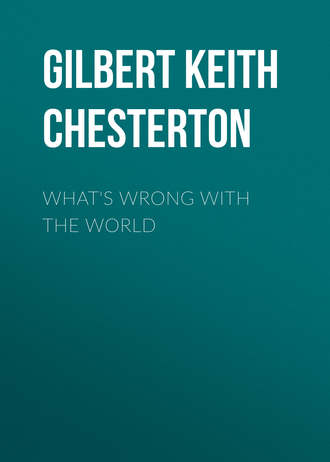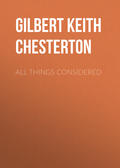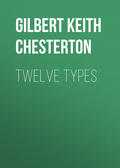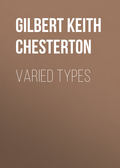
Гилберт Кит Честертон
What's Wrong with the World
III. THE TRICKS OF ENVIRONMENT
After all the modern clatter of Calvinism, therefore, it is only with the born child that anybody dares to deal; and the question is not eugenics but education. Or again, to adopt that rather tiresome terminology of popular science, it is not a question of heredity but of environment. I will not needlessly complicate this question by urging at length that environment also is open to some of the objections and hesitations which paralyze the employment of heredity. I will merely suggest in passing that even about the effect of environment modern people talk much too cheerfully and cheaply. The idea that surroundings will mold a man is always mixed up with the totally different idea that they will mold him in one particular way. To take the broadest case, landscape no doubt affects the soul; but how it affects it is quite another matter. To be born among pine-trees might mean loving pine-trees. It might mean loathing pine-trees. It might quite seriously mean never having seen a pine-tree. Or it might mean any mixture of these or any degree of any of them. So that the scientific method here lacks a little in precision. I am not speaking without the book; on the contrary, I am speaking with the blue book, with the guide-book and the atlas. It may be that the Highlanders are poetical because they inhabit mountains; but are the Swiss prosaic because they inhabit mountains? It may be the Swiss have fought for freedom because they had hills; did the Dutch fight for freedom because they hadn’t? Personally I should think it quite likely. Environment might work negatively as well as positively. The Swiss may be sensible, not in spite of their wild skyline, but be cause of their wild skyline. The Flemings may be fantastic artists, not in spite of their dull skyline, but because of it.
I only pause on this parenthesis to show that, even in matters admittedly within its range, popular science goes a great deal too fast, and drops enormous links of logic. Nevertheless, it remains the working reality that what we have to deal with in the case of children is, for all practical purposes, environment; or, to use the older word, education. When all such deductions are made, education is at least a form of will-worship; not of cowardly fact-worship; it deals with a department that we can control; it does not merely darken us with the barbarian pessimism of Zola and the heredity-hunt. We shall certainly make fools of ourselves; that is what is meant by philosophy. But we shall not merely make beasts of ourselves; which is the nearest popular definition for merely following the laws of Nature and cowering under the vengeance of the flesh. Education contains much moonshine; but not of the sort that makes mere mooncalves and idiots the slaves of a silver magnet, the one eye of the world. In this decent arena there are fads, but not frenzies. Doubtless we shall often find a mare’s nest; but it will not always be the nightmare’s.
IV. THE TRUTH ABOUT EDUCATION
When a man is asked to write down what he really thinks on education, a certain gravity grips and stiffens his soul, which might be mistaken by the superficial for disgust. If it be really true that men sickened of sacred words and wearied of theology, if this largely unreasoning irritation against “dogma” did arise out of some ridiculous excess of such things among priests in the past, then I fancy we must be laying up a fine crop of cant for our descendants to grow tired of. Probably the word “education” will some day seem honestly as old and objectless as the word “justification” now seems in a Puritan folio. Gibbon thought it frightfully funny that people should have fought about the difference between the “Homoousion” and the “Homoiousion.” The time will come when somebody will laugh louder to think that men thundered against Sectarian Education and also against Secular Education; that men of prominence and position actually denounced the schools for teaching a creed and also for not teaching a faith. The two Greek words in Gibbon look rather alike; but they really mean quite different things. Faith and creed do not look alike, but they mean exactly the same thing. Creed happens to be the Latin for faith.
Now having read numberless newspaper articles on education, and even written a good many of them, and having heard deafening and indeterminate discussion going on all around me almost ever since I was born, about whether religion was part of education, about whether hygiene was an essential of education, about whether militarism was inconsistent with true education, I naturally pondered much on this recurring substantive, and I am ashamed to say that it was comparatively late in life that I saw the main fact about it.
Of course, the main fact about education is that there is no such thing. It does not exist, as theology or soldiering exist. Theology is a word like geology, soldiering is a word like soldering; these sciences may be healthy or no as hobbies; but they deal with stone and kettles, with definite things. But education is not a word like geology or kettles. Education is a word like “transmission” or “inheritance”; it is not an object, but a method. It must mean the conveying of certain facts, views or qualities, to the last baby born. They might be the most trivial facts or the most preposterous views or the most offensive qualities; but if they are handed on from one generation to another they are education. Education is not a thing like theology, it is not an inferior or superior thing; it is not a thing in the same category of terms. Theology and education are to each other like a love-letter to the General Post Office. Mr. Fagin was quite as educational as Dr. Strong; in practice probably more educational. It is giving something – perhaps poison. Education is tradition, and tradition (as its name implies) can be treason.
This first truth is frankly banal; but it is so perpetually ignored in our political prosing that it must be made plain. A little boy in a little house, son of a little tradesman, is taught to eat his breakfast, to take his medicine, to love his country, to say his prayers, and to wear his Sunday clothes. Obviously Fagin, if he found such a boy, would teach him to drink gin, to lie, to betray his country, to blaspheme and to wear false whiskers. But so also Mr. Salt the vegetarian would abolish the boy’s breakfast; Mrs. Eddy would throw away his medicine; Count Tolstoi would rebuke him for loving his country; Mr. Blatchford would stop his prayers, and Mr. Edward Carpenter would theoretically denounce Sunday clothes, and perhaps all clothes. I do not defend any of these advanced views, not even Fagin’s. But I do ask what, between the lot of them, has become of the abstract entity called education. It is not (as commonly supposed) that the tradesman teaches education plus Christianity; Mr. Salt, education plus vegetarianism; Fagin, education plus crime. The truth is, that there is nothing in common at all between these teachers, except that they teach. In short, the only thing they share is the one thing they profess to dislike: the general idea of authority. It is quaint that people talk of separating dogma from education. Dogma is actually the only thing that cannot be separated from education. It is education. A teacher who is not dogmatic is simply a teacher who is not teaching.
V. AN EVIL CRY
The fashionable fallacy is that by education we can give people something that we have not got. To hear people talk one would think it was some sort of magic chemistry, by which, out of a laborious hotchpotch of hygienic meals, baths, breathing exercises, fresh air and freehand drawing, we can produce something splendid by accident; we can create what we cannot conceive. These pages have, of course, no other general purpose than to point out that we cannot create anything good until we have conceived it. It is odd that these people, who in the matter of heredity are so sullenly attached to law, in the matter of environment seem almost to believe in miracle. They insist that nothing but what was in the bodies of the parents can go to make the bodies of the children. But they seem somehow to think that things can get into the heads of the children which were not in the heads of the parents, or, indeed, anywhere else.
There has arisen in this connection a foolish and wicked cry typical of the confusion. I mean the cry, “Save the children.” It is, of course, part of that modern morbidity that insists on treating the State (which is the home of man) as a sort of desperate expedient in time of panic. This terrified opportunism is also the origin of the Socialist and other schemes. Just as they would collect and share all the food as men do in a famine, so they would divide the children from their fathers, as men do in a shipwreck. That a human community might conceivably not be in a condition of famine or shipwreck never seems to cross their minds. This cry of “Save the children” has in it the hateful implication that it is impossible to save the fathers; in other words, that many millions of grown-up, sane, responsible and self-supporting Europeans are to be treated as dirt or debris and swept away out of the discussion; called dipsomaniacs because they drink in public houses instead of private houses; called unemployables because nobody knows how to get them work; called dullards if they still adhere to conventions, and called loafers if they still love liberty. Now I am concerned, first and last, to maintain that unless you can save the fathers, you cannot save the children; that at present we cannot save others, for we cannot save ourselves. We cannot teach citizenship if we are not citizens; we cannot free others if we have forgotten the appetite of freedom. Education is only truth in a state of transmission; and how can we pass on truth if it has never come into our hand? Thus we find that education is of all the cases the clearest for our general purpose. It is vain to save children; for they cannot remain children. By hypothesis we are teaching them to be men; and how can it be so simple to teach an ideal manhood to others if it is so vain and hopeless to find one for ourselves?
I know that certain crazy pedants have attempted to counter this difficulty by maintaining that education is not instruction at all, does not teach by authority at all. They present the process as coming, not from the outside, from the teacher, but entirely from inside the boy. Education, they say, is the Latin for leading out or drawing out the dormant faculties of each person. Somewhere far down in the dim boyish soul is a primordial yearning to learn Greek accents or to wear clean collars; and the schoolmaster only gently and tenderly liberates this imprisoned purpose. Sealed up in the newborn babe are the intrinsic secrets of how to eat asparagus and what was the date of Bannockburn. The educator only draws out the child’s own unapparent love of long division; only leads out the child’s slightly veiled preference for milk pudding to tarts. I am not sure that I believe in the derivation; I have heard the disgraceful suggestion that “educator,” if applied to a Roman schoolmaster, did not mean leading our young functions into freedom; but only meant taking out little boys for a walk. But I am much more certain that I do not agree with the doctrine; I think it would be about as sane to say that the baby’s milk comes from the baby as to say that the baby’s educational merits do. There is, indeed, in each living creature a collection of forces and functions; but education means producing these in particular shapes and training them to particular purposes, or it means nothing at all. Speaking is the most practical instance of the whole situation. You may indeed “draw out” squeals and grunts from the child by simply poking him and pulling him about, a pleasant but cruel pastime to which many psychologists are addicted. But you will wait and watch very patiently indeed before you draw the English language out of him. That you have got to put into him; and there is an end of the matter.
VI. AUTHORITY THE UNAVOIDABLE
But the important point here is only that you cannot anyhow get rid of authority in education; it is not so much (as poor Conservatives say) that parental authority ought to be preserved, as that it cannot be destroyed. Mr. Bernard Shaw once said that he hated the idea of forming a child’s mind. In that case Mr. Bernard Shaw had better hang himself; for he hates something inseparable from human life. I only mentioned educere and the drawing out of the faculties in order to point out that even this mental trick does not avoid the inevitable idea of parental or scholastic authority. The educator drawing out is just as arbitrary and coercive as the instructor pouring in; for he draws out what he chooses. He decides what in the child shall be developed and what shall not be developed. He does not (I suppose) draw out the neglected faculty of forgery. He does not (so far at least) lead out, with timid steps, a shy talent for torture. The only result of all this pompous and precise distinction between the educator and the instructor is that the instructor pokes where he likes and the educator pulls where he likes. Exactly the same intellectual violence is done to the creature who is poked and pulled. Now we must all accept the responsibility of this intellectual violence. Education is violent; because it is creative. It is creative because it is human. It is as reckless as playing on the fiddle; as dogmatic as drawing a picture; as brutal as building a house. In short, it is what all human action is; it is an interference with life and growth. After that it is a trifling and even a jocular question whether we say of this tremendous tormentor, the artist Man, that he puts things into us like an apothecary, or draws things out of us, like a dentist.
The point is that Man does what he likes. He claims the right to take his mother Nature under his control; he claims the right to make his child the Superman, in his image. Once flinch from this creative authority of man, and the whole courageous raid which we call civilization wavers and falls to pieces. Now most modern freedom is at root fear. It is not so much that we are too bold to endure rules; it is rather that we are too timid to endure responsibilities. And Mr. Shaw and such people are especially shrinking from that awful and ancestral responsibility to which our fathers committed us when they took the wild step of becoming men. I mean the responsibility of affirming the truth of our human tradition and handing it on with a voice of authority, an unshaken voice. That is the one eternal education; to be sure enough that something is true that you dare to tell it to a child. From this high audacious duty the moderns are fleeing on every side; and the only excuse for them is, (of course,) that their modern philosophies are so half-baked and hypothetical that they cannot convince themselves enough to convince even a newborn babe. This, of course, is connected with the decay of democracy; and is somewhat of a separate subject. Suffice it to say here that when I say that we should instruct our children, I mean that we should do it, not that Mr. Sully or Professor Earl Barnes should do it. The trouble in too many of our modern schools is that the State, being controlled so specially by the few, allows cranks and experiments to go straight to the schoolroom when they have never passed through the Parliament, the public house, the private house, the church, or the marketplace. Obviously, it ought to be the oldest things that are taught to the youngest people; the assured and experienced truths that are put first to the baby. But in a school to-day the baby has to submit to a system that is younger than himself. The flopping infant of four actually has more experience, and has weathered the world longer, than the dogma to which he is made to submit. Many a school boasts of having the last ideas in education, when it has not even the first idea; for the first idea is that even innocence, divine as it is, may learn something from experience. But this, as I say, is all due to the mere fact that we are managed by a little oligarchy; my system presupposes that men who govern themselves will govern their children. To-day we all use Popular Education as meaning education of the people. I wish I could use it as meaning education by the people.
The urgent point at present is that these expansive educators do not avoid the violence of authority an inch more than the old school masters. Nay, it might be maintained that they avoid it less. The old village schoolmaster beat a boy for not learning grammar and sent him out into the playground to play anything he liked; or at nothing, if he liked that better. The modern scientific schoolmaster pursues him into the playground and makes him play at cricket, because exercise is so good for the health. The modern Dr. Busby is a doctor of medicine as well as a doctor of divinity. He may say that the good of exercise is self-evident; but he must say it, and say it with authority. It cannot really be self-evident or it never could have been compulsory. But this is in modern practice a very mild case. In modern practice the free educationists forbid far more things than the old-fashioned educationists. A person with a taste for paradox (if any such shameless creature could exist) might with some plausibility maintain concerning all our expansion since the failure of Luther’s frank paganism and its replacement by Calvin’s Puritanism, that all this expansion has not been an expansion, but the closing in of a prison, so that less and less beautiful and humane things have been permitted. The Puritans destroyed images; the Rationalists forbade fairy tales. Count Tostoi practically issued one of his papal encyclicals against music; and I have heard of modern educationists who forbid children to play with tin soldiers. I remember a meek little madman who came up to me at some Socialist soiree or other, and asked me to use my influence (have I any influence?) against adventure stories for boys. It seems they breed an appetite for blood. But never mind that; one must keep one’s temper in this madhouse. I need only insist here that these things, even if a just deprivation, are a deprivation. I do not deny that the old vetoes and punishments were often idiotic and cruel; though they are much more so in a country like England (where in practice only a rich man decrees the punishment and only a poor man receives it) than in countries with a clearer popular tradition – such as Russia. In Russia flogging is often inflicted by peasants on a peasant. In modern England flogging can only in practice be inflicted by a gentleman on a very poor man. Thus only a few days ago as I write a small boy (a son of the poor, of course) was sentenced to flogging and imprisonment for five years for having picked up a small piece of coal which the experts value at 5d. I am entirely on the side of such liberals and humanitarians as have protested against this almost bestial ignorance about boys. But I do think it a little unfair that these humanitarians, who excuse boys for being robbers, should denounce them for playing at robbers. I do think that those who understand a guttersnipe playing with a piece of coal might, by a sudden spurt of imagination, understand him playing with a tin soldier. To sum it up in one sentence: I think my meek little madman might have understood that there is many a boy who would rather be flogged, and unjustly flogged, than have his adventure story taken away.
VII. THE HUMILITY OF MRS. GRUNDY
In short, the new education is as harsh as the old, whether or no it is as high. The freest fad, as much as the strictest formula, is stiff with authority. It is because the humane father thinks soldiers wrong that they are forbidden; there is no pretense, there can be no pretense, that the boy would think so. The average boy’s impression certainly would be simply this: “If your father is a Methodist you must not play with soldiers on Sunday. If your father is a Socialist you must not play with them even on week days.” All educationists are utterly dogmatic and authoritarian. You cannot have free education; for if you left a child free you would not educate him at all. Is there, then, no distinction or difference between the most hide-bound conventionalists and the most brilliant and bizarre innovators? Is there no difference between the heaviest heavy father and the most reckless and speculative maiden aunt? Yes; there is. The difference is that the heavy father, in his heavy way, is a democrat. He does not urge a thing merely because to his fancy it should be done; but, because (in his own admirable republican formula) “Everybody does it.” The conventional authority does claim some popular mandate; the unconventional authority does not. The Puritan who forbids soldiers on Sunday is at least expressing Puritan opinion; not merely his own opinion. He is not a despot; he is a democracy, a tyrannical democracy, a dingy and local democracy perhaps; but one that could do and has done the two ultimate virile things – fight and appeal to God. But the veto of the new educationist is like the veto of the House of Lords; it does not pretend to be representative. These innovators are always talking about the blushing modesty of Mrs. Grundy. I do not know whether Mrs. Grundy is more modest than they are; but I am sure she is more humble.
But there is a further complication. The more anarchic modern may again attempt to escape the dilemma by saying that education should only be an enlargement of the mind, an opening of all the organs of receptivity. Light (he says) should be brought into darkness; blinded and thwarted existences in all our ugly corners should merely be permitted to perceive and expand; in short, enlightenment should be shed over darkest London. Now here is just the trouble; that, in so far as this is involved, there is no darkest London. London is not dark at all; not even at night. We have said that if education is a solid substance, then there is none of it. We may now say that if education is an abstract expansion there is no lack of it. There is far too much of it. In fact, there is nothing else.
There are no uneducated people. Everybody in England is educated; only most people are educated wrong. The state schools were not the first schools, but among the last schools to be established; and London had been educating Londoners long before the London School Board. The error is a highly practical one. It is persistently assumed that unless a child is civilized by the established schools, he must remain a barbarian. I wish he did. Every child in London becomes a highly civilized person. But here are so many different civilizations, most of them born tired. Anyone will tell you that the trouble with the poor is not so much that the old are still foolish, but rather that the young are already wise. Without going to school at all, the gutter-boy would be educated. Without going to school at all, he would be over-educated. The real object of our schools should be not so much to suggest complexity as solely to restore simplicity. You will hear venerable idealists declare we must make war on the ignorance of the poor; but, indeed, we have rather to make war on their knowledge. Real educationists have to resist a kind of roaring cataract of culture. The truant is being taught all day. If the children do not look at the large letters in the spelling-book, they need only walk outside and look at the large letters on the poster. If they do not care for the colored maps provided by the school, they can gape at the colored maps provided by the Daily Mail. If they tire of electricity, they can take to electric trams. If they are unmoved by music, they can take to drink. If they will not work so as to get a prize from their school, they may work to get a prize from Prizy Bits. If they cannot learn enough about law and citizenship to please the teacher, they learn enough about them to avoid the policeman. If they will not learn history forwards from the right end in the history books, they will learn it backwards from the wrong end in the party newspapers. And this is the tragedy of the whole affair: that the London poor, a particularly quick-witted and civilized class, learn everything tail foremost, learn even what is right in the way of what is wrong. They do not see the first principles of law in a law book; they only see its last results in the police news. They do not see the truths of politics in a general survey. They only see the lies of politics, at a General Election.
But whatever be the pathos of the London poor, it has nothing to do with being uneducated. So far from being without guidance, they are guided constantly, earnestly, excitedly; only guided wrong. The poor are not at all neglected, they are merely oppressed; nay, rather they are persecuted. There are no people in London who are not appealed to by the rich; the appeals of the rich shriek from every hoarding and shout from every hustings. For it should always be remembered that the queer, abrupt ugliness of our streets and costumes are not the creation of democracy, but of aristocracy. The House of Lords objected to the Embankment being disfigured by trams. But most of the rich men who disfigure the street-walls with their wares are actually in the House of Lords. The peers make the country seats beautiful by making the town streets hideous. This, however, is parenthetical. The point is, that the poor in London are not left alone, but rather deafened and bewildered with raucous and despotic advice. They are not like sheep without a shepherd. They are more like one sheep whom twenty-seven shepherds are shouting at. All the newspapers, all the new advertisements, all the new medicines and new theologies, all the glare and blare of the gas and brass of modern times – it is against these that the national school must bear up if it can. I will not question that our elementary education is better than barbaric ignorance. But there is no barbaric ignorance. I do not doubt that our schools would be good for uninstructed boys. But there are no uninstructed boys. A modern London school ought not merely to be clearer, kindlier, more clever and more rapid than ignorance and darkness. It must also be clearer than a picture postcard, cleverer than a Limerick competition, quicker than the tram, and kindlier than the tavern. The school, in fact, has the responsibility of universal rivalry. We need not deny that everywhere there is a light that must conquer darkness. But here we demand a light that can conquer light.







